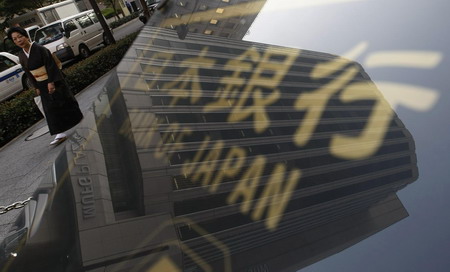Global Biz
Bank of Japan mulls exit from emergency support
(Agencies)
Updated: 2009-10-14 15:23
|
 A woman in a traditional Japanese kimono walks past a signboard of the Bank of Japan at its headquarters in Tokyo October 13, 2009. [Agencies]
|
TOKYO: The Bank of Japan may decide to start withdrawing support for corporate finance on Wednesday, despite government criticism, at a policy meeting that may set the tone for its relationship with the new government.
The outcome of the two-day meeting has few implications for the corporate finance market, which has recovered from the shock of the financial crisis triggered by the collapse of Lehman Brothers last year.
Analysts expect the BOJ to first scrap its buying of commercial paper and corporate bonds from banks, although some market players speculate the BOJ may also end low-interest loans made against corporate debt collateral.
But it would do so in the face of government pressure. Finance Minister Hirohisa Fujii said last week the BOJ should appropriately monitor corporate funding and expressed concerns that the economy was still unstable, though he backtracked later in the week, saying the issue was for the BOJ to decide.
One of his deputies told Reuters in an interview on Wednesday that the government wouldn't request a delay in voting if the Bank of Japan were to decide to end its buying of corporate debt.
"For us to ask for a delay in a vote (on ending corporate debt buying) the finance minister and people under him would need to discuss lots of things, but no such thing has happened in advance," said Naoki Minezaki, one of the government's two senior vice finance ministers.
"That means the government will leave it up to the BOJ's own judgment."
But outspoken banking minister Shizuka Kamei, who heads a small coalition party in the government, has spoken openly against any wind back in funding support.
Kamei told Reuters on Wednesday that the central bank should keep a close eye on the economy when examining ending its corporate financing support.
"It needs to carefully watch the impact its decisions have on the economy," he said.
Analysts see credibility issues for a central bank that is officially independent if it were to bow to government pressure.
"I wouldn't expect any major market reactions. But of course that would undermine the credibility of the BOJ," said Junko Nishioka, chief Japan economist at RBS.
The BOJ is almost certain to keep interest rates on hold.
Annual wholesale price falls narrowed in September from a record drop in August, but economists expect deflation to persist due to weak demand, giving the BOJ an added incentive to keep interest rates near zero for some time.











